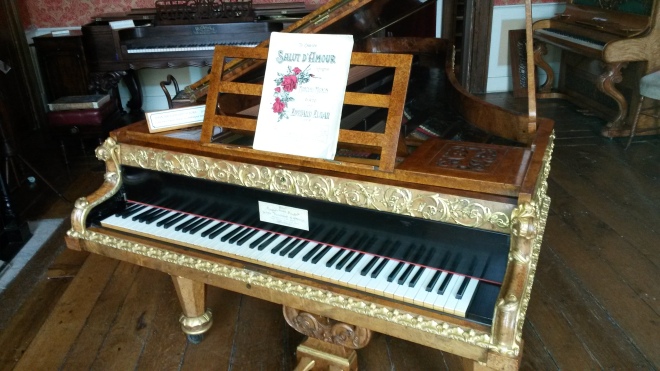Early in December by chance I heard that the Finchcocks collection of keyboard instruments was closing to the public at the end of the year.
Ever since hearing about it I’ve been really keen to visit but it’s so far away from us (and I now realise I’ve been confusing Finchcocks and the Cobbe Collection at Hatchlands which is similarly far away from us).
I got in touch and was allowed to join the last ever visit, that by the Greenwich Probus Club.
It was a wonderful day – to see and hear pianos by Erard, Pleyel and Broadwood the like of which Chopin played. The house is beautiful and there are no modern building in view from the windows. I wanted to say the view hasn’t changed for 200 or 300 years but I know that man manages the landscape.
Guest performers were the pianist Jean Phillips and the team of Martyn (piano) and Phyllis Clarke (flute), Richard Burnett also played.
In short, every piece suited the instrument it was played on and it was a varied selection steering clear of the expected romantic war-horses.
I particularly remember (largely in chronological order of playing)
- Martyn playing the Mendelssohn Venetian Gondola Song in F# minor – a piece which I have unjustifiably passed over – on a 1840s Broadwood which looks as good as it sounded. I scraped a couple of minutes to play another Song without Words on it (G major, Op 62 No 1). The una corda effect was particularly magical.

- Martyn and Phyllis playing the Faure Berceuse – a piece I recognised but could not have named.
- Martyn seemingly reluctantly busking an accompaniment to ‘have yourself a merry little Christmas’ from a lead sheet with a nice sprinkling of exotic chords. This was on an 1875 American square piano by Mathuschek – for this piece I could hardly tell it wasn’t a modern piano. Had he tried a Chopin or Liszt Etude maybe it would have become apparent.
- Richard playing John Stanley on the 1776 John Byfield organ. This had a strong immediate sound with lots of character and presence. It had one manual but a simple foot level switched off the upperwork and trumpet thus making the ‘echo’ effects marked in the score simple to achieve and effective. The keyboard compass went to G below the usual C and that bottom octave had more power than one sometimes finds. This was amply used by Richard exuberantly playing the bass in octaves at times (it is written as single notes). I had a short play of a simple Wesley Pastorale and sensed a real connection between fingers and pipes, something sadly lacking on many church organs I get to play.
- Jean playing a piece by Steibelt which Jane Austen had copied into her personal manuscript book. I found this to be a delightful piece, it could have passed for Mozart or Haydn and would be a good for teaching, but I don’t know its name. This was on a small square piano, yet dynamic variation and a sustain-apparatus (not a pedal, but a knee lever) were apparent. However the sound was much smaller and more domestic than the American square piano referred to earlier.
- a small square piano that looked portable and was indeed called a Travelling Piano by Anton Walter (a maker liked by Mozart). It had a very delicate sound but still had that gradation of volume which distinguishes the piano from most other earlier types of keyboard instruments.
- L’ange de la nuit by Bergmuller. Surprisingly, I cannot find this on the imslp website. Someone must have the score. I remember many decorative trills and it is subtitled as as etude.
- A (Victorian?) version of Hark the herald where pealing-bells passages on the piano preceeded each line of the hymn (which we sung) – simple and enjoyable, we don’t have to listen to the greatest works of art 24-7.
- and finally, December by Tchaikovsky – this was familiar but I didn’t know its name and I’ve since found it in a Tchaikovsky compilation volume from my teenage years. Maybe he repeats his main idea rather too often, but I like it.
Clearly one would have to play more than I did to get a true feel for the different instruments. Pianos developed rapidly in their early years (as does most technology – think of cars or computer). One heard the dynamic range increase and one saw the size of the instruments increase. I know that the key-depth was less in early pianos making certain things easier to play, but I did not get to experience that.
For more information, see the Finchcocks website, though with the closure I don’t know whether it will remain, or search for Finchcocks on youtube.
To repeat it was a wonderful day. I felt a real personal welcome from Katrina, and the Probus Club members with whom I spoke were really friendly. I wish Katrina and Richard the very best in their search for a new home and I thank them for what they have given to the musical world for many years.
